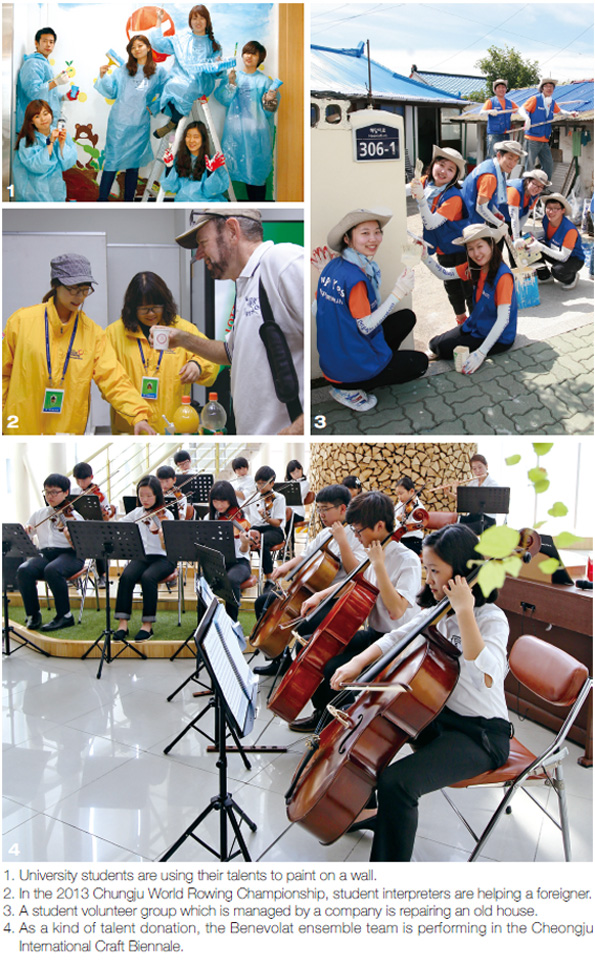

What is talent donation?
Talent donation is a new type of volunteering. It is where people who are experts donate their talent to people who need their ability instead of using it for their private benefit. Its difference from normal volunteering is that it is not labor volunteering like just doing labor or helping people. In other words, it needs professional skills for helping people. Talent donors can practice and apply their talents and abilities to people. Volunteer works in the medical or educational areas, which need professional skills, already exist. However, now we can call it talent donation.
Diversity of talent donation
The number of companies, civil organizations and nonprofit organizations which support and encourage people to donate their talent is increasing. Volunteer Korea is managing the 5 projects to encourage people’s participation of talent donation. The 5 projects are the Schweitzer Project (medical field), the Audrey Hepburn Project (cultural and art field), the Mother Theresa Project (social welfare field), the Daddy Long Legs Project (counseling and educational field) and the Hercules Project (physical training and technique field). Also, there are other various talent donations such as repairing houses or performing or showing movies to people who have difficulty experiencing. Furthermore, celebrities are donating their talents using their popularity in the way of public campaigns or fundraisers. There are not any fixed areas in the talent donation field, so if there are people who want to donate their talent and if there are people who need their talent, it is possible to create new fields of talent donations.
Epilogues of talent donors
Park So-hyung (Cheongju, 36) who donates her talent as a journalist said, “I was asked to give a lecture from my juniors in my university. The purpose of the lectures was to contribute to local culture, and I was willing to accept their request. My lecture’s topic was ‘rational doubt’ about newspaper and TV news. In my lecture, many audience were really interested in the topic and I took a lot of questions from them. I really liked sharing my viewpoint and knowledge as a journalist with other people, and the audience also really wanted to know about my viewpoint as a journalist. Nevertheless, it was my first time to give a lecture on stage, I was not nervous because the audience wanted to know my thoughts and I also wanted to know their thoughts too. We met to share our thoughts through this lecture. It was a really cool lecture to me because I could get a lot of information, which I need as a journalist, from them.”
Choi Hye-ji(Dept. of Ethics Education, ’09) said, “I took part in ‘Soc Soc Camp’ with my friends. This camp’s purpose was to teach children 6 kinds of meaningful values such as challenge, communication, fun, healing, sharing and learning to children, and I planned the camp in accordance with its purpose. When I planned this camp, I was worried about the children’s participation, but this problem was solved by giving stickers to children who actively participated in this camp. Before submitting my application for this camp, I thought that I wouldn’t have any talents, so children would not be likely to enjoy my camp. However, many children enjoyed it and they said, “I want to participate one more time,” and “I don’t want to go home.” When I heard of them, I felt really great.”
University students' participation of talent donation
It’s not only the increase of experts helping with talent donations, but also university students are helping more.
Prof. Lee Jong-hun (Daeduk College of Dept. of Actors & Videos) said, “In talent donations, givers can be receivers and receivers also can be givers. For example, a few weeks ago, my students and I performed for people who have difficulty enjoying cultural life. It was a really meaningful chance for us because we could learn about human relationships with other people. Not only performers can learn about relationships with people, but also the audience can do it. Talent donations let university students realize their possibility and sense of achievement in our society. They can realize, ‘We can do something for people’. Besides, it gives them a chance to look back on their past and they can practically realize what interactions with other people mean.”
He thinks that talent donations can give various experiences to university students, and he said about some viewpoints regarding university student’s talent donations as impure volunteering, “They think that the reason that university students volunteer is for upgrading their career. However, I have a different idea about it. Whether university students start talent donations with any motivation or not, that is not important. The most important thing is the activity itself. If their object for donation is to build their careers but their activity is honest, it is positive. However, if their object for donation is pure, but their activity is dishonest, it is negative.”
Additionally, Prof. Lee Jong-hun said about the effects of talent donation on society, “Talent donations vitalize social communication. In this process, the social safety net gets stronger, and individual personalities are maximized, so happy lives can be actualized. Culture donations, such as plays and performances especially make various ways of communication, so it can be possible for emotional communication to overcome rational communication.”
By Kang Ill-guㅣig33@cbnu.ac.kr
By Seo Yeo-ryungㅣyr34@cbnu.ac.kr


 All
All Feature
Feature






 Kang Ill-gu & Seo Yeo-ryung
Kang Ill-gu & Seo Yeo-ryung











